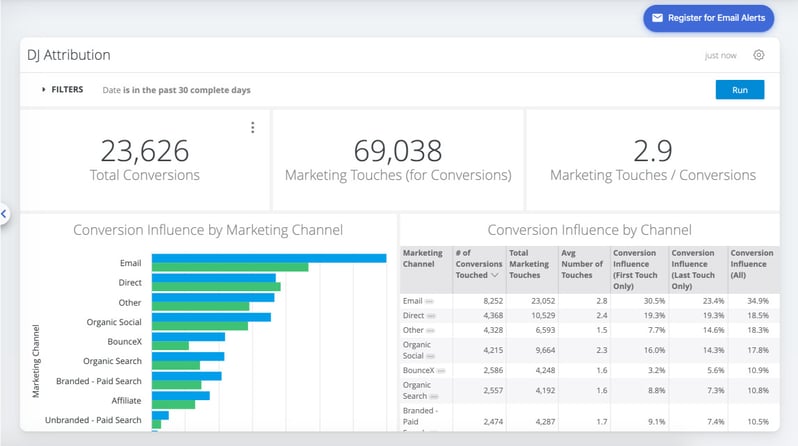Are Market Research Analysts in Demand?
April 10, 2020 •DJ Team

As volatility in markets across the globe abounds, the need for sophisticated data analysis is more critical than ever. That's one of the main drivers for demand for market research analysts today.
These professionals provide their companies and clients with the information necessary to make quick decisions that are necessary to respond to rapidly changing situations.
Market Research Analysis
Market research analysis is the study of market conditions for products and services. It's a data-driven profession that relies on information such as consumer demographics, preferences, buying habits, and responses to advertising and marketing campaigns. This market research data helps inform decisions about messaging, price, sales and marketing campaigns.
 Market research analysts gather both qualitative and quantitative information. In addition to sales data, analysts rely on marketing research sources such as surveys, focus groups, interviews, questionnaires, public opinion reviews and market intelligence, and competitor analysis tools.
Market research analysts gather both qualitative and quantitative information. In addition to sales data, analysts rely on marketing research sources such as surveys, focus groups, interviews, questionnaires, public opinion reviews and market intelligence, and competitor analysis tools.
Often a market research analyst is among the first to see information about market trends and results from marketing campaigns. Analysts often have an inside position to that helps them evaluate the impact of their company's or client's work.
There's a good reason for this focus. Market research analysts are often expected to quickly turn around an analysis of data. This digital transformation allows them to rapidly improve the analysis of massive sets of data.
Consider the Internet of Things (IoT), which is the network of connected devices equipped with sensors, connectivity tools and transmission capabilities. Products from doorbells to automobiles generate massive amounts of data that analysts can collect in real time to help them make better recommendations to their teams.
Market Analysts
Market research analysts use various methods and approaches to gather information, analyze it and report on it.
A significant focus of their work is to gather data about market conditions for the product or service they're analyzing. They also collect consumer insights and data about their competitors. For the polls, surveys, questionnaires and other means of collecting data, they need to create the tools that will be used. They may be asked to develop or conduct interviews or review literature. This job requirement includes knowledge of how to develop meaningful questions and approaches to gather the desired information.
As market analysts collect different types of data, they must also convert this data into usable information. That means using statistical software programs that can make sense of cross-channel marketing data. This information can then be converted into tables, charts and written reports.
Collecting the information and presenting it is just one component of market analysis. There is also the need to interpret the information and make recommendations to optimize performance.
These interpretations can help determine how effective a marketing campaign performed, inform future campaigns, forecast future sales or determine market segments. Employers expect their market research analysts to deliver actionable insights, even when the insights are not fully apparent. Clients often demand answers on a direction for future work, including critical investment information.
A career in this field results in several marketable market research analyst benefits, including the ability to use complex software tools, communicate information clearly and effectively, and look for patterns, trends and insights in large data sets. These skills -- analytics, communication and critical thinking -- are valuable and applicable across multiple other roles.
Market Research Analyst Careers
For a market research analyst career, you should expect to complete at least a bachelor's degree. Students should expect to complete coursework in mathematics, statistics, statistical analysis, marketing, advertising and research methods. Students may major in math, statistics, computer science, business administration, communications or other social sciences. Some positions may require a master's degree as part of market research qualifications.
While there is no mandatory certification, some professional organizations provide programs to demonstrate mastery.
According to the U.S. Department of Labor, the median market research analyst salary in 2018 was $63,120. The top-paying industries for a market research analyst job were publishing ($74,360 average salary), management of companies and enterprises ($73,490), finance and insurance ($69,680), wholesale trade ($61,410) and management, scientific, and technical consulting services ($60,870).
The most lucrative cities for market research analyst positions are San Jose, San Francisco, Seattle, Bridgeport, Conn., and Houston.
The agency projects that create demand for market research analysts is expected to grow by 20 percent by 2028, driven by the increase in data generated and the realization of the value of these roles in more industries.
Software for Market Research Analysis
Market research analysts need to be able to use some of the most common communications tools, including mastering spreadsheet programs like Microsoft Excel or even conducting more advanced forms of data analysis with programming languages such as Python or SQL.
However, spreadsheet programs are often not enough. They also need other technologies that help them collect, interpret and display information. That means using software that displays information effectively and databases of historical consumer information.
At DemandJump, we simplify marketing analyst's jobs. Our platform simplifies the the collection analysis of data from multiple sources, providing automated reporting and customizations to meet specific business needs, and allowing your teams to understand the entire customer journey in one place. Click here to learn more about DemandJump’s solutions.

Featured Articles
Categories
- Attribution Tracking (13)
- Channel Optimization (11)
- Consumer Insights (68)
- Content Marketing (251)
- Data Science (8)
- Digital Marketing (6)
- Digital Transformation (26)
- Enterprise (10)
- Lead Generation (14)
- Market Intelligence (8)
- Marketing Analytics (39)
- Marketing Attribution (57)
- Marketing Management (153)
- Marketing Operations (86)
- Organic Search (222)
- Paid Search (52)
- Pillar-Based Marketing (63)
- Programmatic Advertising (9)
- SaaS Content (14)
- SaaS Marketing (29)
- Search Marketing (111)
- SEO Keyword Research (28)
- SEO Pillar (18)
- SEO Strategy (46)
- SMB (5)
- Website Content (12)


